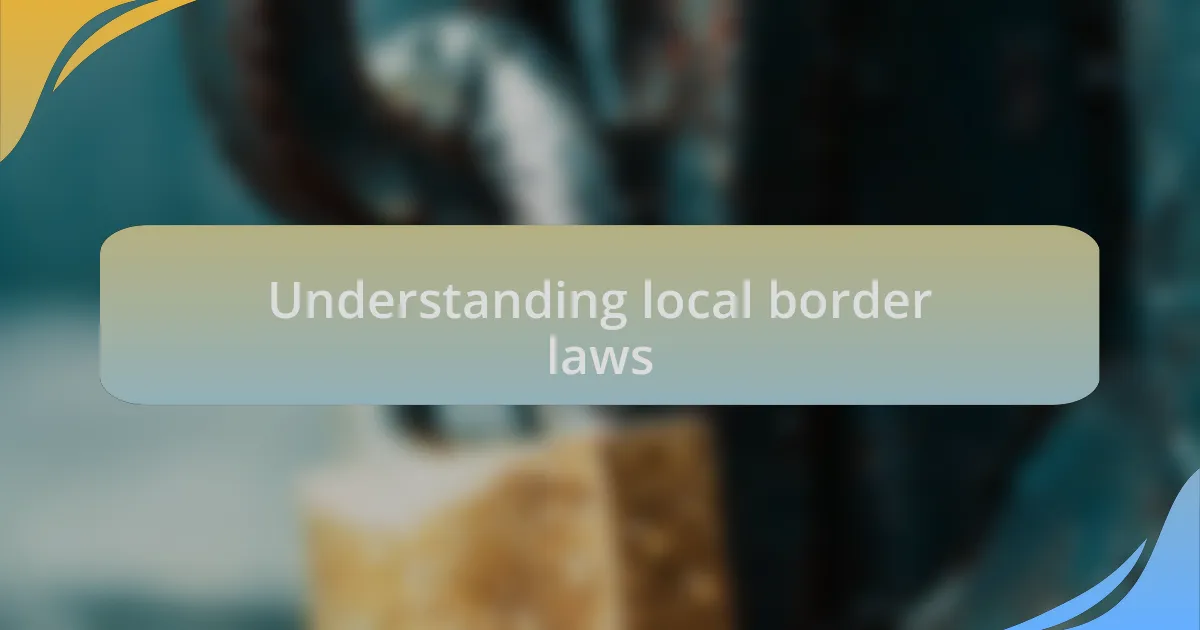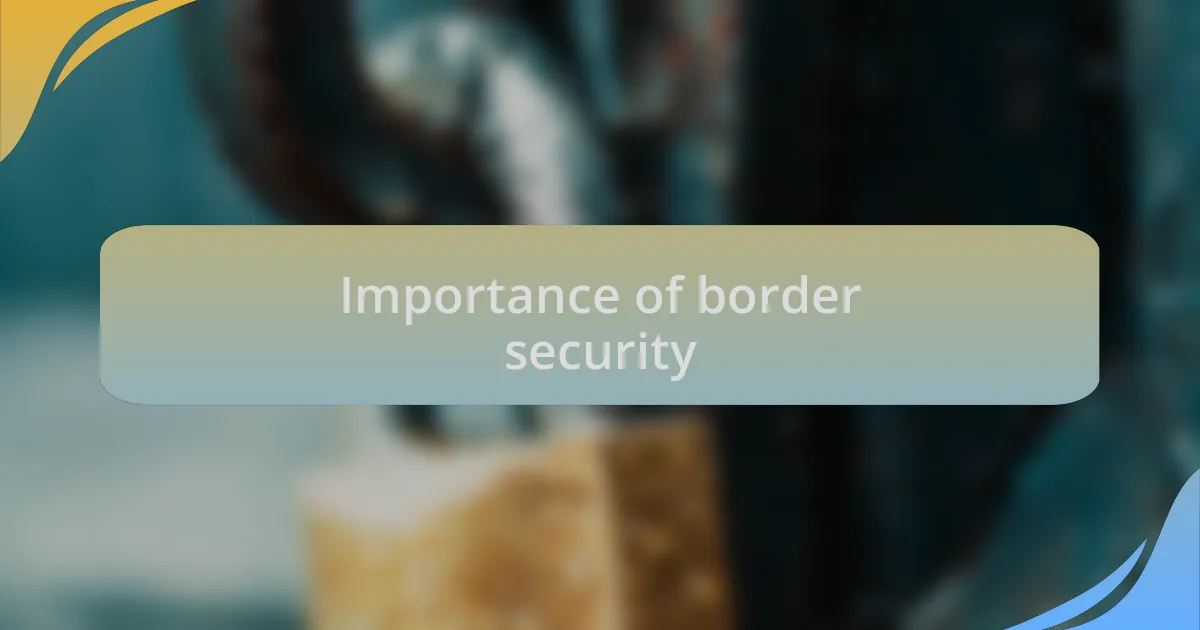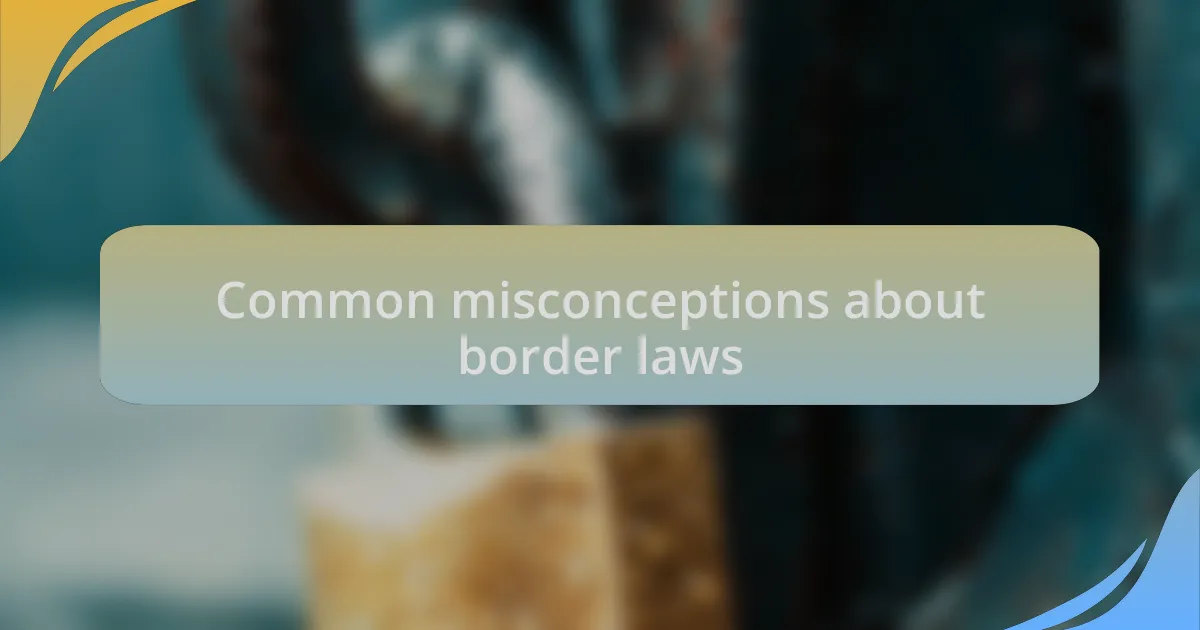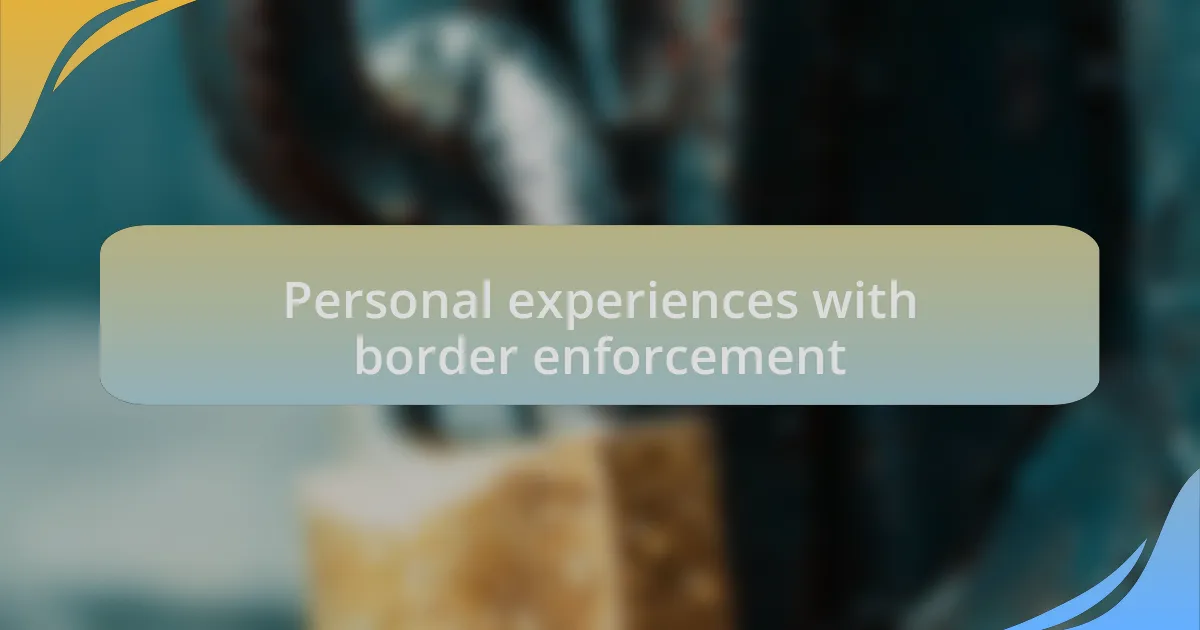Key takeaways:
- Understanding local border laws is essential to avoid fines and legal issues, as they can differ significantly by location.
- Border security is vital for national safety, influencing local economic health and community stability.
- Common misconceptions include the belief that crossing borders negates local laws, and that such laws are static and unchanging.
- Respectful engagement with border officials and being informed about local regulations can enhance the border crossing experience.

Understanding local border laws
Understanding local border laws is crucial, especially since they can vary significantly from one place to another. I remember once crossing a state border where a sign warned about strict agricultural regulations. It struck me how vital it is to be aware of such rules to avoid hefty fines or even legal trouble.
Local border laws often intersect with national policies, creating a complex web that can be challenging to navigate. Have you ever found yourself confused by differing regulations between states? I certainly have, and it’s a reminder of how essential it is to stay informed.
These laws aren’t just bureaucratic jargon; they reflect local priorities and security measures. For instance, when visiting a friend near the border, I noticed heightened security checks, which initially unsettled me. Understanding that these measures are in place to protect communities can help ease concerns, but it also highlights the need for ongoing education about local practices.

Importance of border security
Border security plays a vital role in maintaining the safety and integrity of a nation. It isn’t just about preventing illegal crossings; it’s also about protecting citizens from various threats. I recall driving through a border area and feeling a sense of unease as I passed through checkpoint after checkpoint, realizing firsthand how essential these measures are in safeguarding our communities.
The presence of robust border security can significantly influence local stability and economic health. I once spoke with a small business owner located near a border crossing who shared how regulations impacted their ability to operate efficiently. This experience opened my eyes to the delicate balance between security and commerce that local laws must navigate.
Moreover, heightened border security fosters a sense of national pride and unity. One day, at a community gathering, I overheard conversations about local law enforcement collaborating more effectively with federal agencies. It reinforced my belief that when we prioritize border security, we not only protect our borders but also bolster the trust and collaboration necessary for a cohesive society.

Common misconceptions about border laws
Many people believe that once you cross a border, you can legally do whatever you want. I remember chatting with a friend who traveled extensively, and he thought just because he was in a different country, local laws didn’t apply to him. This misconception can lead to serious consequences; every country has its own specific regulations, and ignorance of those laws is never an acceptable excuse.
Another common misunderstanding is that border laws are only pertinent to national security. During a visit to a family member who lives near the U.S.-Canada border, I was surprised to learn how local laws also affect day-to-day activities and community interactions. The truth is, these regulations influence issues like immigration, trade, and even environmental protection, intertwining security with the lives of residents.
Some think that border laws are static and unchanging. I’ve encountered this mindset during discussions at community events, where individuals express frustration about perceived outdated rules. However, border laws constantly evolve in response to current events, security threats, and societal changes. Staying informed about these changes is crucial for anyone living in border areas, as they can directly impact one’s life and livelihood.

Personal experiences with border enforcement
I’ve had my share of experiences navigating border enforcement that really opened my eyes. Once, while traveling back from Canada, I encountered a lengthy delay at customs. It struck me how intense the scrutiny can be, leaving me with mixed emotions – anxiety about what they might find and a profound respect for the thoroughness of the process. Why is it that we often take for granted the importance of these checks until we are faced with them ourselves?
There was another incident during a family trip near the U.S.-Mexico border. As we moved through the area, I distinctly remember seeing a Border Patrol checkpoint and feeling a twinge of apprehension. The visible presence of enforcement officers made me realize how closely border laws are woven into the fabric of daily life for many residents. I couldn’t help but wonder how many local families are directly affected by these regulations every day.
It’s fascinating to me how cultural exchanges at border zones can sometimes clash with strict enforcement. One evening, at a local festival right near the border, I observed how people celebrated their shared heritage despite the heavy presence of law enforcement. This duality of festivity and vigilance is something that has deeply influenced my understanding of border laws. It reminded me that while enforcement is vital for security, it’s equally essential to foster community and connection.

Tips for navigating border laws
When navigating border laws, staying informed is key. I remember a time when I was unsure of the specific regulations surrounding certain items I wanted to bring back into the U.S. I did a little research and discovered that many common items, like certain fruits or plants, could lead to fines or confiscation. Don’t you think it’s better to know the rules before you pack your bags?
Another crucial tip is to approach border officials with respect and honesty. During one encounter, I was asked a simple question about my travel purpose. Instead of feeling defensive, I answered openly. This transparency not only eased the tension but seemed to create a rapport that facilitated a smoother inspection. Isn’t it interesting how a friendly demeanor can sometimes work wonders in potentially stressful situations?
Lastly, understanding the local border laws in your area can significantly impact your experience. I once attended a community meeting where local enforcement agents discussed changes in regulations. Listening to them share insights made me realize how crucial it is for us, as residents, to be aware of the evolving landscape. Don’t you think it’s empowering to be educated about the laws that directly affect our community?